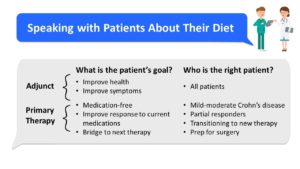
Dietary interventions have demonstrated successes in treating inflammatory bowel disease (IBD). But with limited guidance from national organizations and a history of low-quality, nonrandomized studies, how can clinicians advise their patients on the most effective, evidence-based dietary strategies?
During Digestive Disease Week® (DDW) 2022, James D. Lewis, MD, MSCE, professor of medicine and epidemiology at the Perelman School of Medicine, University of Pennsylvania, reviewed some of the randomized clinical data on two dietary strategies — exclusive enteral nutrition (EEN) and whole food diets — in patients with IBD.
“Historically, studies of whole food diets for IBD were of low quality and quite heterogenous,” said Dr. Lewis. “Fortunately, a number of studies in the last 5 to 10 years are of better quality and are beginning to provide evidence that diet can be an important part of managing IBD. Still, we don’t have proof of the definitive diet that is right for everybody.”
Exclusive enteric nutrition has shown some of the most impressive results, even rivaling steroids for the treatment of Crohn’s disease. However, the formula-based EEN diets can be difficult for patients to adhere to.
“If we had a medication that was as effective in Crohn’s disease as oral nutritional formula, with as little toxicity, that would be the breakthrough medication of all time,” said Dr. Lewis. “The problem is that nobody wants to sustain themselves on these oral formulas over the long term.”

“Most diets are created somewhat empirically,” said Dr. Lewis. “For the most part, we don’t really understand how nutrition therapies work, even the enteral formulas that are very effective.”
Dr. Lewis stressed that while the efficacy of these dietary approaches is important, perhaps just as important are the patient’s goals and their ability to adhere to the diet.
“When talking to your patients about their dietary patterns, your recommendations may vary depending on their goals,” said Dr. Lewis. “Do they want to use diet as an adjunct to improve their health? Do they want to use diet as a bridge to a new therapy or as a primary therapy, with the goal of being medication free?”
For example, patients looking to use diet as an adjunct therapy may consider following a Mediterranean-style diet, while EEN diets are a good approach as a bridge to a new therapy, particularly in those who wish to avoid steroids.
Dr. Lewis presents “Interventional dietary studies in IBD” on Saturday, May 21, at 10:46 a.m. PDT as part of the Farron and Martin Brotman, MD, Lecture: Food as a Drug in IBD clinical symposium.



One Response
The diet includes what? We know vegetables and fruits but what not to eat.